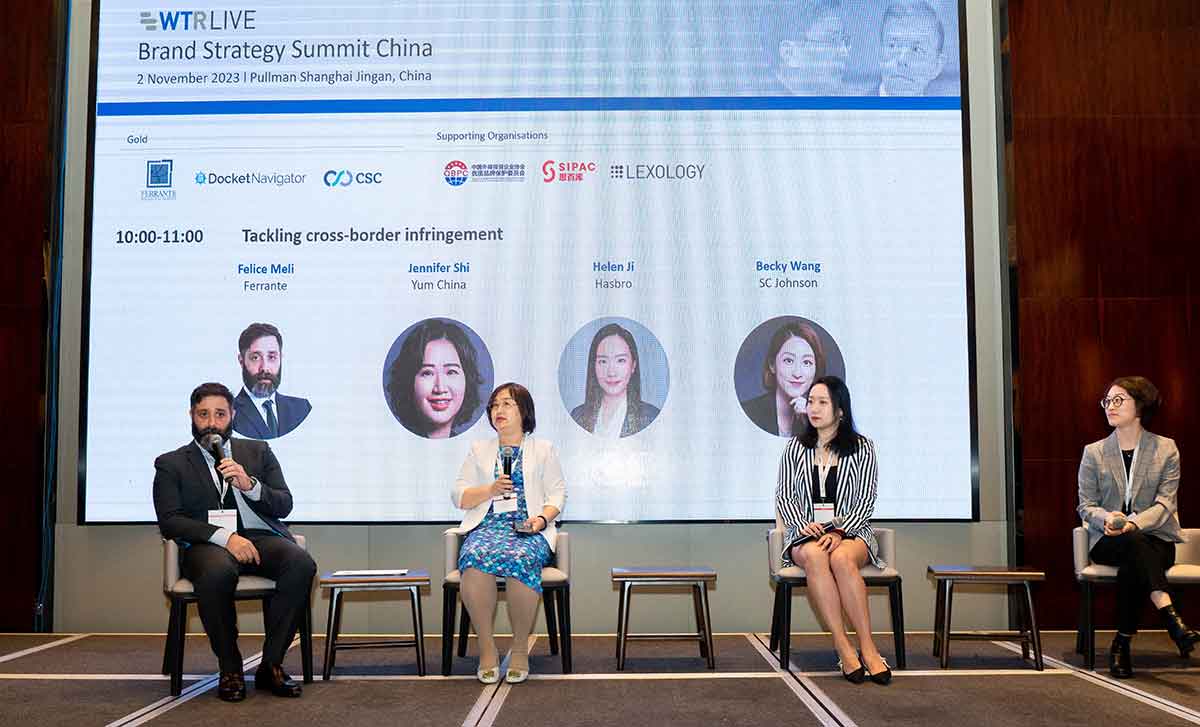
Ferrante IP recently participated in the successful WTR Live Brand Strategy Summit, which took place in Shanghai on 2 November 2023. The event provided us with the opportunity to discuss the strategic issues involved in Tackling Cross Border Intellectual Property Infringement with a panel of prominent IP professionals. The panel, which was moderated by Felice Meli, Head of Anti-Counterfeiting at Ferrante's Shanghai office, covered topics which are central to an effective anti-counterfeiting strategy for any well-known and successful brand.
The IP professionals joining Felice at the event, were Jennifer Shi, Head of Global Intellectual Property at Yum China, Helen Ji, Senior Attorney at Hasbro and Becky Wang, Senior IP Manager at S.C. Johnson & Son. The discussions centred on three main anti-counterfeiting strategies: approaches for assessing existing IP protections and when it is appropriate to utilise alternative rights; how to build a cross-border infringement monitoring program; and the optimal allocation of personnel and resources for effective operations and strategic approaches on parallel imports.
The panel explored the many facets involved in the management of an effective anti-counterfeiting strategy, which involves an awareness of your brand, the need to involve Customs, with early one-to-one meetings to provide them with familiarity with your products. and the protection of the brand by registration. Without registration of a trademark, a brand can find that a competitor has already registered a similar mark, which will result in the loss of financial resources and valuable time for the genuine owner. Early legal intervention should be instigated where counterfeiting is suspected, as timely legal advice from a specialist IP firm is essential, either at the outset, to prevent infringement or at least to mitigate its effect. Proper legal representation can prevent the need to undertake costly litigation or by enabling the brand owner to enter into an agreement with the infringer, whereby the infringer is offered a licence or the opportunity to become an authorised distributor.
Helen and Becky highlighted the importance for brands to be efficient and work closely with online platforms and internet organisations in the liability pursuing process, as well as engaging in formal negotiations with potential infringers, which is a better strategy than issuing lawsuits at the outset. Brands should have a full knowledge of their products and the countries in which Chinese businesses are expanding, such as Vietnam and India. Becky identified that awareness of the foreign market includes the knowledge of a new factory opening in India for example. That factory could potentially be a base for the sales and exportation of counterfeit goods within the country. As Helen noted, it is important to seek out the source of any illegal activity and locate those factories which are associated with the 'Big Fish', the counterfeiters who wield the power in criminal organisations. These are the targets and they should be brought to the attention of Customs, who should be notified when it is known that vehicle carrying infringing products has been traced and tracked.
Jennifer emphasised the need to utilise all available resources that business can access, both within their own organisation and externally, such as any financial aid offered by the the government. For example, the Shanghai Administrative government actively encourages businesses to instigate foreign lawsuits and it recommends the purchase of trademark insurance for that purpose. The availability of stipends for anti-counterfeiting activity is not well known, nor is the fact that some Shanghai Authorities provide financial assistance for IP litigation, ranging from 200,000 to 1 million CNY.
Felice Meli provided a very useful insight into strategic approaches to the problem of parallel imports, including the situations where whilst some products may be categorised as parallel imports of genuine products, there are circumstances where infringement is found to have occurred, including when an infringer translates an existing brand name into a word mark in Chinese characters, inconsistent with Chinese transliteration adopted by the brand owner. Other infringing activity involves advertising unauthorised stores and products and activity that constitutes unfair competition, such as the use of the brands photographs, models or celebrity endorsement.
The panel enjoyed an informative and robust debate, highlighting the major issues facing brands today, both globally and in China and offered experienced IP professionals the opportunity to discuss not only the problems caused by cross-border IP infringement, but more importantly, the anti-counterfeiting strategies to defeat it.

Stay IP to date